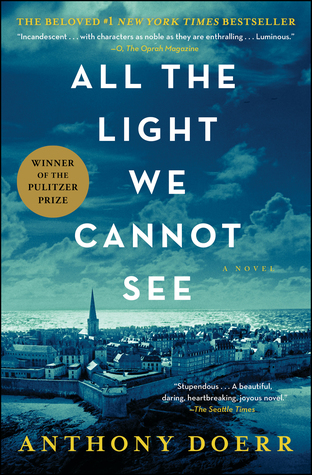Title: All the Light We Cannot See
Author: Anthony Doerr
# of Pages: 530 (paperback)
Genre: Fiction, Historical Fiction, War
Rating: ★★★★★
Synopsis: Marie-Laure lives in Paris near the Museum of Natural History, where her father works. When she is twelve, the Nazis occupy Paris and father and daughter flee to the walled citadel of Saint-Malo, where Marie-Laure’s reclusive great uncle lives in a tall house by the sea. With them they carry what might be the museum’s most valuable and dangerous jewel. In a mining town in Germany, Werner Pfennig, an orphan, grows up with his younger sister, enchanted by a crude radio they find that brings them news and stories from places they have never seen or imagined. Werner becomes an expert at building and fixing these crucial new instruments and is enlisted to use his talent to track down the resistance. Deftly interweaving the lives of Marie-Laure and Werner, Doerr illuminates the ways, against all odds, people try to be good to one another.
Review: When people were raving about how good this book is, I didn't quite believe them.
What caught my attention first was the cover. It's stunning aerial view of the city (what I believe is Saint-Malo, the story's setting) with such a mysterious title largely printed across the sky. I only saw this book because it was nominated for The Best of the Best Goodreads awards (where it ended up placing second). If this book is one of the best of the best, it must be worth reading.
The cashier at the bookstore I bought it from said I would be crying throughout the whole book. This is not entirely accurate. I didn't cry at all. There are some occurrences which may warrant tears, but many of such events are not presented in such a way that would incite it. While this book did not emotionally ruin me, it didn't stop me from loving the story.
Set during World War II, All the Light We Cannot See tells the story of two children on opposite sides of the war in parallel. Both children are born into the conflict and neither have a strong desire to be involved in the war. However, circumstance brings the war to them and leaves them behind in its destruction. Their struggle to live their own lives is gripping and harrowing, making this book a real page turner.
This book is completely comprised of third person POV switching. Yes, there were a lot of times where I wanted the story to switch its focus to a different character at times (this is the usual problem I have with POV switching). However, to tell these stories in parallel, POV is essential. Also, many of the chapters are fairly short, so I never felt like I was "stuck" with one character for too long.
A bigger problem I noticed people complaining about is the time period switching. The book switches between 1944 ("present day" setting for this book) and the character's pasts (ten-ish years prior) in chunks. However, I did not find this confusing at all mostly because the chunks in 1944 progressed rather slowly (only a few days at most). The story of the protagonist's pasts comprised the main part of the story, with the occasional check-in with the characters in 1944. The story wouldn't be as interesting if it were to not have with time-period-switching element; the characters' pasts slowly reveal how the characters found themselves in the situation they're in during 1944.
Is this a happy read? No. But life is not always full of daisies and roses. Is this book worth reading? Absolutely.










No comments:
Post a Comment